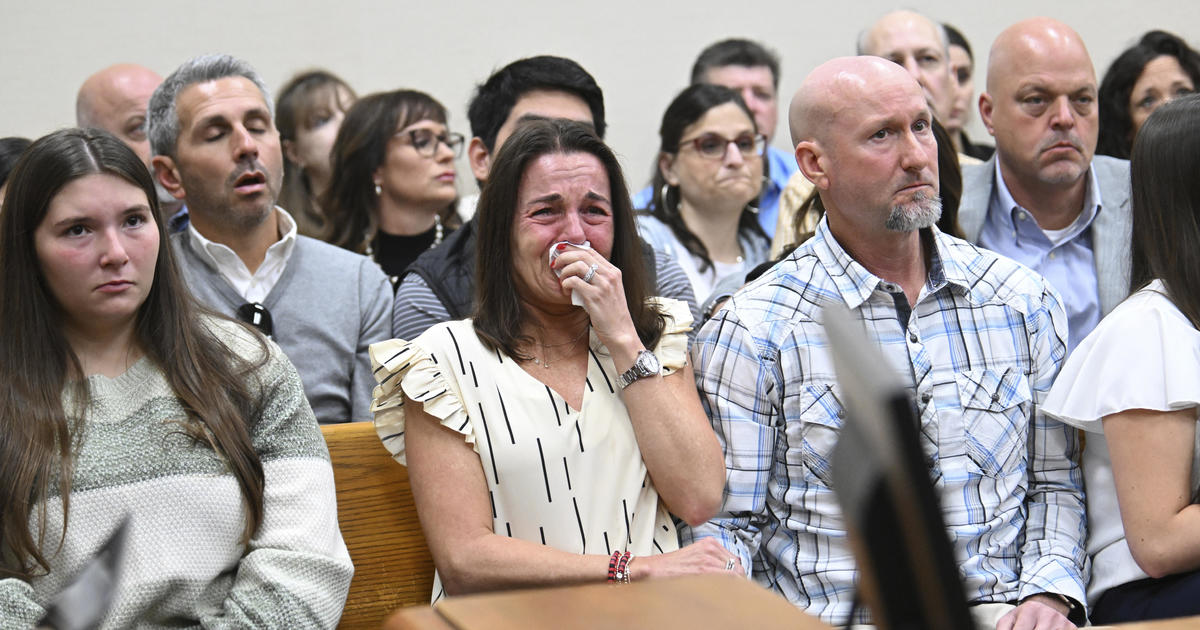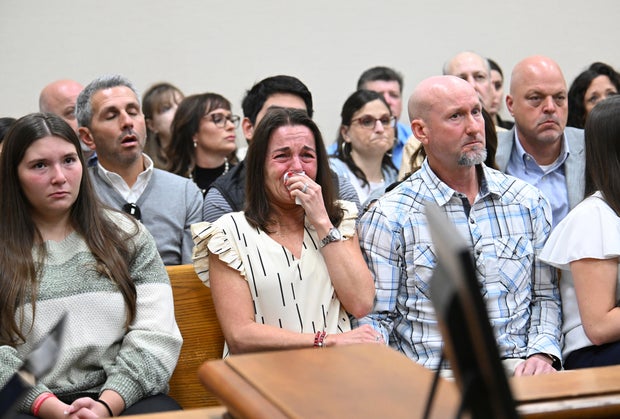Georgia nursing student Laken Riley texted and called her mom as she headed out for a run to see whether she had time to chat – but then didn’t respond to her mother’s calls or increasingly frantic text messages.
Riley called her mother at 9:03 a.m. on Feb. 22, and by the time her mother called back about 20 minutes later, the student had encountered Jose Ibarra on a wooded running trail at the University of Georgia, according to trial testimony. Prosecutors said Ibarra killed Riley after a struggle, and data from Riley’s smartwatch shows her heart stopped beating at 9:28 a.m.
After Riley failed to answer the phone, her mother, Allyson Phillips, texted her several times, casually at first but then with increasing concern, according to data pulled from Riley’s phone.
At 9:37 a.m., her mother texted, “Call me when you can.” Phillips called twice, and when her calls went unanswered, she texted her daughter at 9:58 a.m., “You’re making me nervous not answering while you’re out running. Are you OK?” Phillips texted again at 11:47 a.m., writing, “Please call me. I’m worried sick about you.” She and other family members continued to call Riley.
Phillips cried in court as the text messages were read aloud by Georgia police Sgt. Sophie Raboud, who examined data from Riley’s phone, CBS News producer Jarred Eggleston reported. Raboud also testified about video from surveillance cameras near the wooded trail, and Phillips and some other family members and friends cried as video played showing Riley running on the trail the morning of her death.
Hyosub Shin / AP
Ibarra, 26, is charged with murder and other crimes in Riley’s death in February, and his trial began Friday. He has pleaded not guilty.
He waived his right to a jury trial, meaning the case will be decided alone by Athens-Clarke County Superior Court Judge H. Patrick Haggard. The case could go to the judge by the end of Tuesday.
The killing added fuel to the national debate over immigration when federal authorities said Ibarra illegally entered the U.S. in 2022 and was allowed to stay in the country while he pursued his immigration case. Riley, 22, was a student at Augusta University College of Nursing, which also has a campus in Athens, about 70 miles east of Atlanta.
Surveillance video also showed a man who prosecutors say is Ibarra walking around an apartment complex where a female graduate student said someone tried to get into her apartment and peered in the window early the day Riley was killed. The man is seen going up to the door of that apartment six times over a period of roughly an hour, twice opening the outer screen door, Raboud testified.
Georgia Bureau of Investigation Special Agent Lucas Breyer testified about reviewing the body camera video from the officer who found Riley’s body in the woods. He testified that her clothes were “heavily manipulated,” describing the waistband of her running tights as having been pulled down some and her jacket, shirt and sports bra having been pulled way up.
CBS News’ Eggleston reported that some of the crime scene testimony was so gruesome that members of Riley’s family left the courtroom.
Prosecutor Sheila Ross said during her opening statement that Ibarra had gone out “hunting for females” that morning in February and that he killed Riley after a struggle when she “refused to be his rape victim.” Law enforcement officers have testified there was no evidence that Riley was sexually assaulted.
Defense attorney Dustin Kirby said in his opening that Riley’s death was a tragedy and called the evidence in the case graphic and disturbing. But he said there is not sufficient evidence to prove that his client killed Riley.
Ross told the judge Monday that she expected to finish calling witnesses Tuesday, and defense attorneys said their witnesses should take half a day at most. Prosecutors had already called nearly two dozen witnesses over the first two days of testimony, Friday and Monday. That included law enforcement officers, Riley’s roommates and a woman who lived in the same apartment as Ibarra.
On Monday, prosecutors played a recording of a jail phone call from May between Ibarra and his wife, Layling Franco. FBI specialist Abeisis Ramirez, who translated the call from Spanish, testified that Ibarra told Franco that he had been at the University of Georgia looking for work, and that his wife repeatedly said she was fed up and that she wanted him to tell the truth.
Franco “continues to ask, ‘What happened with the girl?’” and said Ibarra “must know something,” Ramirez said. He responds: “Layling, enough.” Ramirez said Franco told Ibarra that it’s crazy that police only found his DNA.
Riley’s parents, roommates and other friends and family packed the courtroom Friday and again Monday and Tuesday.
Republicans, including President-elect Donald Trump, blamed Democratic President Joe Biden’s border policies for her death. As he spoke about border security during his State of the Union address weeks after the killing, Biden mentioned Riley by name.
In March, FBI Director Christopher Wray offered unusually expansive comments on Riley’s murder.
“I want to tell you how heartbroken I am — not just for the family, friends, classmates, and staff who are grieving Laken’s loss,” Wray told a group gathered at the University of Georgia. “I’m saddened to see that sense of peace shattered by Laken’s murder and the subsequent arrest of a Venezuelan national who’d illegally entered the country in 2022.”
He said the FBI was doing “everything [it] can to help achieve justice for Laken.”


Leave a Reply